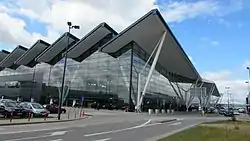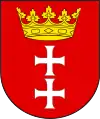Tricity, Poland
Tricity, or Tri-City (Polish: Trójmiasto [Polish pronunciation: [trujˈmʲastɔ]], German: Dreistadt, Kashubian: Trzëgard) is a metropolitan area in northern Poland (in Pomeranian Voivodeship), consisting of three cities: Gdańsk, Gdynia and Sopot, as well as minor towns in their vicinity. They are situated adjacent to one another, in a row on the coast of Gdańsk Bay, Baltic Sea, in Eastern or Gdansk Pomerania (often referred to as Pomerelia in English). The Tricity metropolitan area has a population of over 1 million people.
Tricity
Trójmiasto | |
|---|---|
Urban area | |
.jpg.webp)  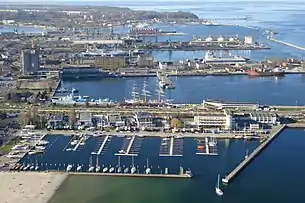    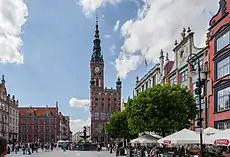 | |
 Tricity Map of the Tricity area | |
| Coordinates: 54°26′N 18°33′E | |
| Country | Poland |
| Voivodeship | Pomeranian |
| Government | |
| • Mayor of Gdańsk | Aleksandra Dulkiewicz |
| • Mayor of Gdynia | Wojciech Szczurek |
| • Mayor of Sopot | Jacek Karnowski |
| Area | |
| • Urban area | 414.81 km2 (160.16 sq mi) |
| Population (2018) | |
| • Urban area | 748,986 |
| • Density | 1,806/km2 (4,680/sq mi) |
| • Metro | 1,098,379 |
| Time zone | UTC+1 (CET) |
| • Summer (DST) | UTC+2 (CEST) |
| Area code(s) | +48 058 |
| Car Plates | GA, GD, GSP |
The name Trójmiasto was used informally or semi-formally only, until 28 March 2007, when the "Tricity Charter" (in Polish Karta Trójmiasta) was signed as a declaration of the cities' cooperation.
Economy
Nearly 35% of taxpayers from Tricity are in the middle and high taxable income groups (average for Poland 10%). Approximately 12% of Tricity taxpayers are in the highest taxable income group (Polish average 3%).
Population
The total population of the 3 cities comprising Tricity (Gdańsk + Gdynia + Sopot):
- XII.1960: 481,100 inhabitants (286,900 + 150,200 + 44,000)
- XII.1970: 604,800 inhabitants (365,600 + 191,500 + 47,700)
- XII.1975: 693,800 inhabitants (421,000 + 221,100 + 51,700)
- XII.1980: 744,400 inhabitants (456,700 + 236,400 + 51,300)
- XII.2004: 754,960 inhabitants (460,524 + 253,650 + 40,785)
- XII.2006: 748,126 inhabitants (456,658 + 251,844 + 39,624)
- XII.2019: 752,954 inhabitants (470,907 + 246,348 + 35,719)
The Tricity metropolitan area also includes Wejherowo, Reda, Rumia, Pruszcz Gdański and several other communities. The total population in 2006 was 1,100,500, in an area of 1580.69 km².
- Largest urban areas of the European Union
- Largest European metropolitan areas
The Tricity continuous urban area includes following cities:
| city | area 1996 km² |
area 2017 km² |
pop. 1996 | pop. 1999 | pop. 2003 | pop. 2019 |
| Gdańsk | 265.03 | 261.96 | 462,336 | 457,937 | 461,011 | 470,907 |
| Gdynia | 135.49 | 135.14 | 251,932 | 255,014 | 253,500 | 246,348 |
| Sopot | 17.31 | 17.31 | 43,360 | 42,333 | 41,017 | 35,719 |
| Pruszcz Gdański | 16.47 | 16.47 | 21,470 | 21,757 | 23,187 | 31,326 |
| Rumia | 32,86 | 30.10 | ? | 40 200 | 43 000 | 49,230 |
| Reda | 26.39 | 33.46 | 15,422 | 17,510 | 17,868 | 26,307 |
| Wejherowo | 25.65 | 26.99 | 47,357 | 47,038 | 46,900 | 49,505 |
| Total | 513.42 | 504.96 | 882,871 | 884,080 | 885,240 | 909,342 |
According to official EU publication[1] the population of Larger Urban Zone of Tricity is 1 098 379.
Education
The Tricity is an important center of education.
- Gdańsk: Number of universities: 13 (2010) Number of students: 52,436 (2009) Number of graduates: 10,439 (2001)
- Gdynia: Number of universities: 7 (2010) Number of students: 21,362 (2010)
Some of the universities in the Tricity:
- Academy of Physical Education in Gdańsk
- Academy of Fine Arts in Gdańsk
- Academy of Music in Gdańsk
- Gdynia Maritime University
- Polish Naval Academy in Gdynia
- Medical University of Gdańsk
- University of Gdańsk
- Gdańsk University of Technology
- SWPS University in Sopot
- Sopot University of Applied Sciences
- Gdańsk School of Banking
- Gdańsk Management College
- Gdańsk Higher School of Humanities
- Gdańsk Administration School
- Social Economic Higher School in Gdańsk
- The Higher School of Tourism and Hotel Industry in Gdańsk
- Academy of International Economic and Political Relations in Gdynia
- Kwiatkowski University of Business and Administration in Gdynia
- Pomeranian Higher School of Humanities in Gdynia
- The Higher School of Physical Culture and Tourism in Sopot
- Sopot College
Entertainment
Cinemas:
- Gdańsk Film Centre (studio cinemas)
- Helikon
- Kameralne
- Neptun
- Kinoplex
- Multikino Gdynia (closed in 2018)
- Multikino Gdańsk
- Multikino Sopot
- Multikino Rumia
- Żak
- Helios Gdynia
- Polonia
Theatres:
- Wybrzeże Theatre
- Danuta Baduszkowa Musical Theatre in Gdynia
- Witold Gombrowicz Municipal Theatre in Gdynia
- Atelier Theatre in Sopot
- Dreams Theatre
- Miniatura Theatre in Gdańsk
- Theatre Znak in Gdańsk
- Wybrzeżak Theatre
- Scena Kameralna Teatru Wybrzeże
- Summer Scene of Gdynia's Municipal Theatre
- Scena Teatralna ŻAK
- Theatrum Gedanense Foundation[2]
Opera house and Philharmonic
- Forest Opera in Sopot
- Frederic Chopin Polish Baltic Philharmonic
- Polska Filharmonia Kameralna in Sopot
- The Baltic Opera
Museums and art galleries
- Gdańsk City Gallery[3]
- Chodowiecki and Grass House
- Państwowa Galeria Sztuki in Sopot
- National Museum[4]
- Zbrojownia Sztuki[5]
- Art Cybernetics Institute (ICS)
- CSW Łaźnia
- Art Lab Wyspa
- multiple small noninstitutional galleries (Galeria UL, Tajna Galeria, Brama Wyżynna, KIT)
- Museum of the Second World War[6]
Climate
Tricity has a temperate climate with warm summers and cold winters that can be very severe. Rain is possible all year round. Summer is the best time to visit when temperatures range from 70 °F to 90 °F (20 °C to 30 °C), but evenings can be cool enough to require a sweater. Winters are wet, cold and grey.
| Climate data for Tricity (Gdańsk) | |||||||||||||
|---|---|---|---|---|---|---|---|---|---|---|---|---|---|
| Month | Jan | Feb | Mar | Apr | May | Jun | Jul | Aug | Sep | Oct | Nov | Dec | Year |
| Average high °C (°F) | 0 (33) |
0 (33) |
4 (40) |
9 (49) |
15 (60) |
18 (66) |
20 (69) |
20 (69) |
16 (61) |
11 (52) |
5 (41) |
1 (35) |
10 (50) |
| Average low °C (°F) | −4 (24) |
−4 (24) |
−1 (29) |
1 (35) |
6 (43) |
9 (49) |
11 (53) |
11 (53) |
8 (47) |
4 (40) |
0 (33) |
−2 (28) |
3 (38) |
| Average precipitation mm (inches) | 38.1 (1.5) |
27.9 (1.1) |
27.9 (1.1) |
30.5 (1.2) |
43.2 (1.7) |
55.9 (2.2) |
71.1 (2.8) |
71.1 (2.8) |
61.0 (2.4) |
48.3 (1.9) |
55.9 (2.2) |
45.7 (1.8) |
576.6 (22.7) |
| Source: Weatherbase[7] | |||||||||||||
Sport
Tricity has a number of professional teams, which compete in basketball, volleyball, speedway, handball, rugby union and football.
The most known football clubs, contesting the Tricity Derby, are Lechia Gdańsk and Arka Gdynia, both of which also possess highly successful rugby teams (RC Arka and RC Lechia. There is a third top-flight Polish rugby team Ogniwo Sopot, making the Tricity Poland's rugby capital. The third football club is Bałtyk Gdynia.
Wybrzeże Gdańsk are the Tricity's speedway team, formerly a multi-sports club, now its only other remaining section is the reactivated handball team, former ten-times men's Polish champions.
Asseco Gdynia and Trefl Sopot are the two men's professional basketball teams, while Lotos Gdynia are their female counterparts.
Transport
The Tricity has a well-developed public transport system.
Development of the Tricity was smoothed by the construction of the city train (SKM) 1951, binding the whole area from Tczew by Gdańsk, Sopot 1953, Gdynia 1956, Reda, Rumia to Wejherowo 1957.
The backbone of the Tricity is the inner highway. It starts in Gdańsk and goes through Sopot, Gdynia, Rumia and Reda to Wejherowo. It consists of 2-4 lanes in each direction.
In 1975 the dual carriageway Tricity Beltway (Obwodnica Trójmiejska) was constructed. It starts in the vicinity of Pruszcz Gdański and goes through the western districts of Gdańsk to Gdynia-Chylonia.
There is a plan to build a new line of Szybka Kolej Miejska to connect the Stadion Miejski with Gdańsk Lech Wałęsa Airport.
Local Rail
The Tricity area is served by the SKM rail network (known in Polish as Szybka Kolej Miejska or "Fast Urban Railway"). It operates many routes in the area, acting partly as a commuter rail connecting the outer-lying towns and villages of the area with each other and the central cities of Gdańsk, Gdynia and Sopot, and partly as a sort of metro or light rail service in the urban core centred around the three main cities. The frequencies are ranging from every 6 minutes during peak time on the main common section between Gdańsk and Gdynia to 30 minutes at the farthest ends. The local rail network has had a unifying effect on the urban area since it began service in 1951, creating a frequent and reliable service which connects the various settlements of the region.
In 2015, the Pomorska Kolej Metropolitalna (PKM, Pomeranian Metropolitan Railway) opened, connecting the centrally located Gdańsk Wrzeszcz with Gdańsk Lech Wałęsa Airport. The 19.5 km line also provides connections to the SKM network at its northern and southern termini.
Intercity Rail
The area is well connected to the rest of the Pomerania region, as well as Poland and the rest of Europe. The Przewozy Regionalne network provides a regional rail service connecting the cities and towns of the Pomerania. Gdańsk Główny and Gdynia Glowna serve as major rail hubs for the area, with these stations and several others offering inter-city services to cities around Poland and in other countries, operated by Polish State Railways under the PKP Intercity branding. Most of the stations that are served by regional and inter-city rail are also part of the above-mentioned SKM network.
Airport
Gdańsk Lech Wałęsa Airport is one of the three main international Polish airports. Its position is associated with a well-developed network of domestic and international transport connections provided in response to the growing demand for business and tourist travel.
The Gdańsk Airport is located a mere 10 km from the centre of Gdańsk, about the same distance from the centre of Sopot and 23 km from the centre of Gdynia. The continually expanding road system which connects the airport with the city centres allows drivers to cover the distances in about 15–20 minutes. The close vicinity of the Tri-city by-pass and junctions with state motorways nos. 1, 6 and 7 facilitates access from areas outside the Tri-city. The convenient location of the airport makes it easy for travellers and cargo carriers to transfer from air to road, and also to the railway network and seaports. Gdańsk Lech Walesa Airport has its own railway siding which can be used for handling large lots of cargo dispatched by air.
The efficient Gdańsk Airport operates even the biggest planes and allows thousands of tourists to visit the Pomerania province every day. Just in front of the main entrance to the passenger terminal, the visitors can find a bus that will take them to the city centre. They may also choose to take a taxi that will take them wherever they want to go in the area of the Tri-City for a relatively small price.
Getting airport by bus
- to/from Gdańsk Wrzeszcz - line 110
- to/from Gdańsk - line 210
- to/from Gdańsk Wrzeszcz/ Gdańsk Central Train Station - night line N3
- to/from Gdynia Central Train Station - SKM/PKM line

Airplanes connections with GDN:
- Ålesund (WizzAir)
- Aarhus (Eurolot)
- Aberdeen (WizzAir)
- Amsterdam (Eurolot)
- Belfast (EasyJet)
- Barcelona Girona (WizzAir)
- Birmingham (Ryanair)
- Bournemouth (WizzAir)
- Bremen (Eurolot)
- Bristol (EasyJet)
- Cardiff (bmibaby)
- Cologne / Bonn (WizzAir)
- Copenhagen (SAS)
- Cork (WizzAir)
- Coventry (WizzAir)
- Doncaster Sheffield (WizzAir)
- Dortmund (WizzAir)
- Dublin (Ryanair)
- East Midlands Airport (bmibaby)
- Eindhoven (WizzAir)
- Frankfurt (LOT, Lufthansa)
- Frankfurt Hahn (Ryanair)
- Glasgow Prestwick (WizzAir)
- Gothenburg (WizzAir)
- Hamburg Lubeck (WizzAir)
- Haugesund (WizzAir)
- Helsinki (Finnair)
- Iraklion (LOT)
- Karlskrona Ronneby
- Katowice (Eurolot)
- Kraków (Eurolot)
- Leeds Bradford Airport (Ryanair)
- Liverpool (WizzAir)
- London Gatwick Airport (EasyJet)
- London Luton Airport (WizzAir)
- London Stansted Airport (Ryanair)
- Malmö Airport (WizzAir)
- Munich (LOT)
- Oslo (Norwegian, SAS)
- Oslo Torp (WizzAir)
- Poprad (Eurolot)
- Salzburg (Eurolot)
- Stockholm Skavsta Airport (WizzAir)
- Turku (WizzAir)
- Vilnius (AirBaltic)
- Warsaw (LOT)
Ferries
Ferryboats connections with Gdynia, Sopot, Gdańsk:
- Gdynia - Karlskrona - Gdynia (Stena Line)
- Gdynia - Hanko (Finnlines)- freight service only
- Gdańsk - Nynashamn - Gdańsk (Polferries)
Buses
The variety and a number of connections make the travel around the Tri-City and surrounding areas very easy. One of the most popular means of transport in the Pomerania province is the public bus. There is a great number of bus lines and they cover every district of the three cities of the metropolis. In Gdynia, except normal buses, there are also Trolleybuses.
Foreign representatives
Gdańsk:
- Consul of the Kingdom of Denmark
- General Consulate of China
- General Consulate of Russia
- General Consulate of the Republic of Belarus
- General Consulate of the Federal Republic of Germany
- General Consulate of Ukraine
- Honorary Consul of the Federal Democratic Republic of Ethiopia
- Honorary Consul of the United Kingdom of Great Britain and Northern Ireland
- Honorary Consul of the Republic of Latvia
- Honorary Consul of the Republic of Lithuania
- Honorary Consul of the United Mexican States
- Honorary Consul of the Kingdom of the Netherlands
- Honorary Consul of Peru
- Honorary Consul of the Kingdom of Spain
Gdynia:
- General Consulate of the Kingdom of Sweden
- General Consulate of Romania
- Honorary Consul of the Czech Republic
- Honorary Consul of the Republic of Finland
- Honorary Consul of Italy
- Honorary Consul of Azerbaijan
- Honorary Consul of the Republic of Austria
- Honorary Consul of Chile
- Honorary Consul of the Republic of Cyprus
- Honorary Consul of the People's Republic of Bangladesh
- Honorary Consul of the Kingdom of Norway
- Honorary Consul of France
Sopot:
- General Consulate of the Republic of Iceland
- Honorary Consul of the Republic of Slovakia
See also
- Kashubia
- Little Kashubian Tricity, which lies directly northwest of Tricity
- Tricity Landscape Park
References
- "Urban Audit". European Commission. 2006. Archived from the original on 2013-05-31.
- Sprintnet. "Theatrum Gedanense". www.teatr-szekspir.gda.pl.
- "Gdańska Galeria Miejska". www.ggm.gda.pl.
- "Muzeum Narodowe w Gdańsku". www.mng.gda.pl/.
- "Zbrojownia Sztuki". zbrojowniasztuki.pl.
- "Museum of the Second World War".
- "Weatherbase: Historical Weather for Gdańsk, Poland". Retrieved February 11, 2008.
External links
| Wikimedia Commons has media related to Tricity, Poland. |
| Wikivoyage has a travel guide for Trójmiasto . |
| Look up Trójmiasto in Wiktionary, the free dictionary. |
- Virtual Tour on beautiful Coast in Gdynia-Orlowo
- Gdańsk transport system (PL, ENG)
- Gdynia transport system (PL)
- SKM (Fast Urban Railway) - map (PL)
- Tricity Public Communication Timetables
- Map and Guide to agglomeration (PL, ENG)
- Map of population density in the urban area
- Tricity for tourists from Scandinavia (ENG)
- City of Gdynia (PL, ENG, DE, SWE, DEN, FR, RU)
- City of Sopot (PL, ENG, DE, FR, RU)
- City of Gdańsk (PL, ENG)
- Pomeranian Voivodeship Tourist Portal (PL, ENG, DE, FR, RU)
- City break in Tricity (ENG)
- Pomeranian Science and Technology Park in Gdynia (PL, ENG, DE, FR, IT, DEN)
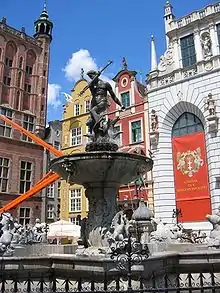
_2010-07-16_193.jpg.webp)

.jpg.webp)

.jpg.webp)
